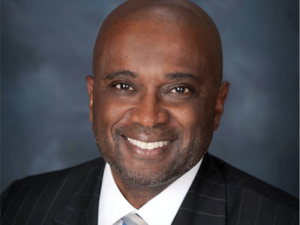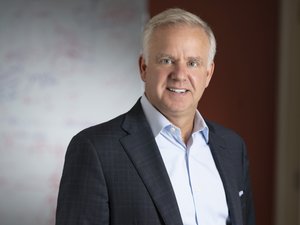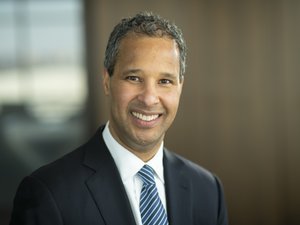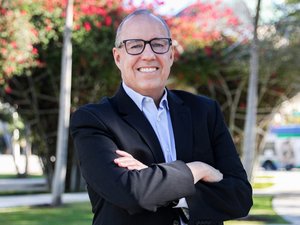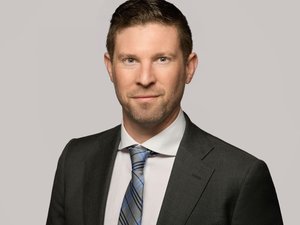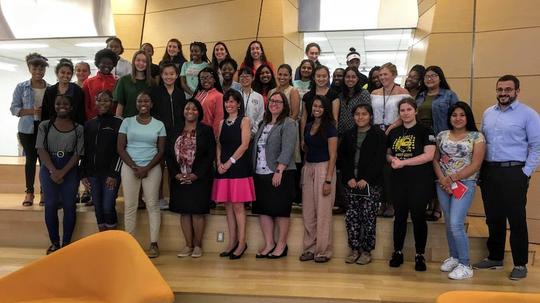
"I love it. I love it. Like, I love it."
Stephanie Walcott, 17, is spending her summer as a student in a local Girls Who Code classroom. She'll be a senior at the Flint Hill School in Oakton, Va. in the fall.
The seven-week immersion program launched June 26, and a month in, Walcott said she's far from ready to see it end.
"I look forward to coming here everyday. Honestly, truly," she said.
Girls Who Code is a national nonprofit that promotes closing the gender gap in the tech industry. They offer coding and programming classes to high school-aged girls around the country.
After-school clubs and classes are available in all 50 states (and D.C.), and the immersion program is currently being offered in 10 states.
Each classroom is sponsored by a company invested in their mission: empowering young women to pursue careers in STEM-related fields. Walcott is one of 20 girls in a class sponsored by Software.org: The BSA Foundation.
Software.org launched in April as an independent sister organization to BSA | The Software Alliance. Whereas BSA focuses on advocacy, Software.org took over more of the research, education and philanthropic initiatives, said Executive Director Chris Hopfensperger.
BSA has sponsored a D.C. Girls Who Code summer class since 2015, but with the launch of Software.org, that responsibility shifted over. This year's class is being held at the Georgetown University School of Continuing Studies building.
"I think I can speak for everyone here when I say that Girls Who Code is one of our favorite things to do over the course of the year," Hopfensperger said. "We talk a lot in D.C. about the importance of software to the economy, to the future, but we don't often get to have a direct role in people's lives. Girls Who Code is really an opportunity for us to put our work where our mouths are."
The girls come in at 9:00 a.m. every day. Part of the day is dedicated to a set of lectures around the unit of the week, but most of the time is discussion-based and dedicated to working on projects hands-on, said Maya Shende, 24, a Girls Who Code instructor.
Shende graduated from Roanoke College in Virginia with a Bachelor's in computer science, physics and math. She just finished her first year in George Washington University's computer science PhD program.
Shende was one of two women in her college computer science graduating class, she said. Now, at GW, she's still one of only four-or-five women in the computer science PhD program.
Walcott, too, said she's the only girl in both her high school computer science class, and in an after-school cybersecurity club, called Cyber Patriots.
"The whole cause of furthering women in tech and empowering women in tech is very important to me," Shende said. "I see no reason why women shouldn't be on the same playing field as men."
"This is the most fulfilling experience I have ever had in my life," she added. "To date."
As a Girls Who Code instructor, Shende received a full curriculum that she fills in and presents to her class as she sees fit. Every week is dedicated to a different programming language or platform.
"I see no reason why women shouldn't be on the same playing field as men."
"We have a lot of speakers who come in and we've had quite a few field trips," she said. "We just had a speaker from SpaceX, and also a panel of women from IBM."
So far, the girls have gone on a tour of Georgetown University, met with Congresswoman Robin Kelly (D-IL), spent the day at Palantir Technologies and participated in a Congressional Girls Who Code Hackathon on Capitol Hill.
They'll also be paired with female mentors from the tech industry at a mentorship event July 28. They'll spend the day listening to a panel of women and learning how to network.
"We connect them with companies that could potentially hire them as interns or one day, further down the road, as full-fledged employees," Hopfensperger said. "There's a focused effort not just on the coding, but also on the ideas of professionalism and how to prepare yourself for any career, really."
Walcott applied to Girls Who Code because she wanted to learn about computer science. Her classmate, Alice Xue, 17, a rising senior at Centennial High School in Ellicott City, Md., said she did, too.
"For a really long time, I really wanted to learn how to code, but it was something I thought was really difficult. I had a lot of classmates that were really proficient in coding, so I felt like I kind of wanted to be like in the 'in' with it," she said.
Other girls, like Mamai Mulwanda, 17, another rising senior at Westfield High School in Chantilly, Va., joined the program "just to explore."
"It was just kind of like another career option," she said.
Mulwanda had always wanted to study political science and economics in college. Now, almost done with her stint in Girls Who Code, she said she'll have to add computer science to her resume.
"I think I'm going to triple major," she said.
The best part of the summer, they agreed, has been the friendships grown out of their classroom.
"In the simplest terms, we are going to change the world."
"If you have any trouble or anything, you have a whole group of people there working with you and when you figure something out together, it's a really good feeling," said Xue.
Xue said her favorite unit so far was HTML - "because Alice is a G at HTML," Walcott said of her friend. Mulwanda enjoyed the Python projects they worked on, and Walcott's favorite part is yet to come.
"My favorite project will be when I use everything that I learned this summer in the future."
All three girls came in with limited-to-no knowledge of coding. Graduation Day is Aug. 9. They'll walk away, they said, with much more than just a thorough understanding of computer science basics.
"Before, this wasn't really something I was focused on. This makes it as something I really see in my future," Xue said. "I want to work in robotics, maybe artificial intelligence."
Mulwanda said she'd like to take on tech from the back end, focusing on policy.
"We have a lot of questions, like about who gets to make the rules, like, 'Who are you to say I can't do this?' I want to be the one to say, "You can't do this,'" she said.
Walcott added, "In the simplest terms, we are going to change the world. We are going to change it in a positive way. We're going to move forward. That's the direction we're going in."
Photos courtesy of Software.org and Girls Who Code.
